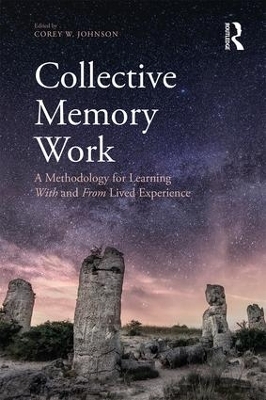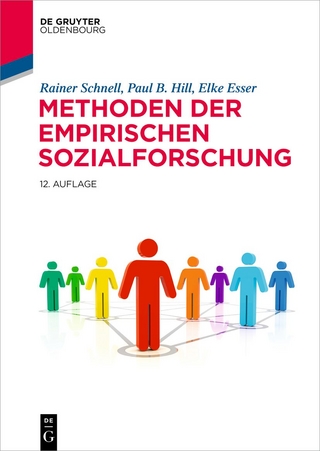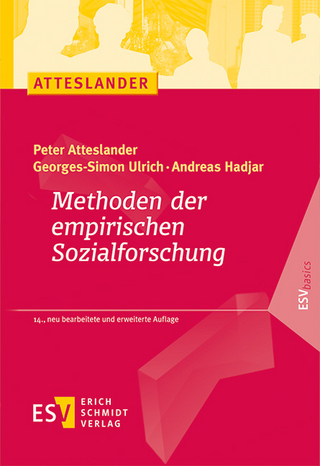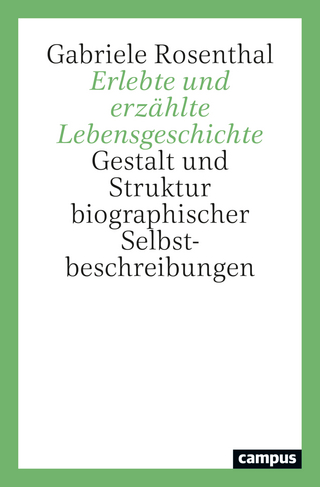
Collective Memory Work
Routledge (Verlag)
978-1-138-23792-6 (ISBN)
The seemingly mundane events of daily life create a complex knowledge base of lived experience to be explored. But how does one research common experiences and account for context, culture, and identity? A dilemma arises because experience is not just embedded in events, but also in the socially constructed meanings associated with those events.
This book details the philosophical underpinnings, design features and implementation strategies of Collective Memory Work – a methodology frequently employed by social justice activists/scholars. Collective Memory Work can provide scholars with unique and nuanced ways to solve problems for and with their participants.
Most importantly, the chapters also detail projects and social justice in action, analysing their participants’ real stories and experiences: projects that focus on LGBTQ youth, #blacklivesmatter activists, white faculty working at historically Black colleges and universities, men’s media consumption and much more. Written in an engaging and accessible style, readers will come to understand the potential of their own qualitative research using Collective Memory Work.
Corey W. Johnson is a Professor in the Faculty of Applied Health Sciences at the University of Waterloo. His research focuses on the power relations between dominant (white, male, heterosexual, etc.) and non-dominant populations in the cultural contexts of leisure. He currently co-edits Leisure Sciences and has written Fostering Social Justice through Qualitative Research: A Methodological Guide (Routledge 2015)
Acknowledgements
Part One
1. The History and Methodological Tradition(s) of Collective Memory Work Corey W. Johnson, Dana B. Kivel and Luc S. Cousineau
Part Two
2. How Does Media Consumption Contribute to Understandings of Manhood According to Race and Sexual Identity? Rudy Dunlap and Corey W. Johnson
3. How do Adults Remember Their Parents’ Reaction to Gender Non-Conformity? Rebecca Eaker, Anneliese Singh and Corey W. Johnson
4. How Can Memories of Enacted Masculinity Create More Effective Elementary School Teachers? Chris Hansen and Corey W. Johnson
5. What are the Experiences of White faculty at Historically Black Colleges and Universities? Needham Yancey Gulley, Anthony F. Patterson and Corey W. Johnson
6. How Do We Sustain Activism?: LGBTQ and Black People Share Their Positive and Negative Experiences Jemelleh Coes, Needham Yancey Gulley and Corey W. Johnson
7. Using Collective Memory Work to Create Safer Schools for Queer and Trans Students: A Story of Love, Liberation, and Transformation Anneliese A. Singh and Corey W. Johnson
Part Three
8. Why Shouldn’t I Do Collective Memory Work? Potential Challenges and Pitfalls Nikki Laird and Corey W. Johnson
9. Are you next? Common Elements of Collective Memory Work Corey W. Johnson and Harrison Oakes
Contributing Authors
| Erscheinungsdatum | 22.08.2018 |
|---|---|
| Zusatzinfo | 1 Halftones, black and white; 1 Illustrations, black and white |
| Verlagsort | London |
| Sprache | englisch |
| Maße | 152 x 229 mm |
| Gewicht | 244 g |
| Themenwelt | Sozialwissenschaften ► Soziologie ► Empirische Sozialforschung |
| ISBN-10 | 1-138-23792-2 / 1138237922 |
| ISBN-13 | 978-1-138-23792-6 / 9781138237926 |
| Zustand | Neuware |
| Informationen gemäß Produktsicherheitsverordnung (GPSR) | |
| Haben Sie eine Frage zum Produkt? |
aus dem Bereich


